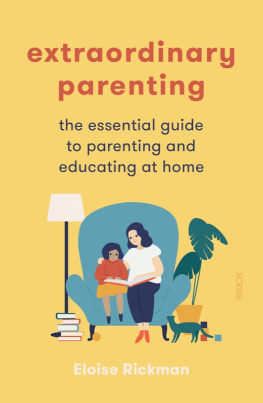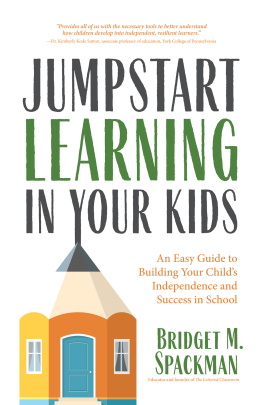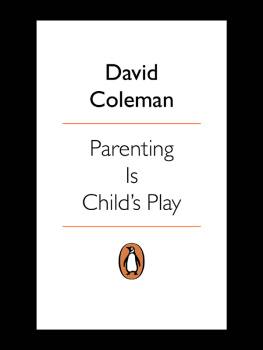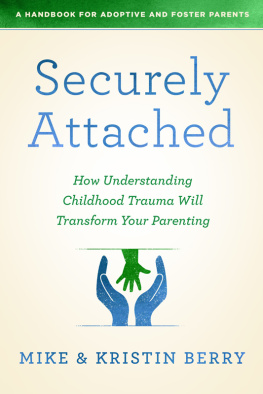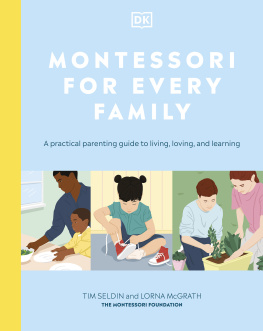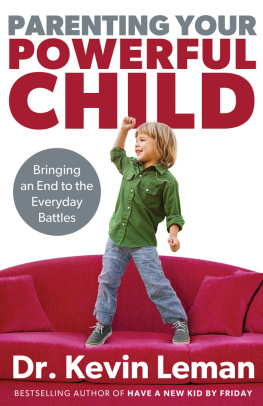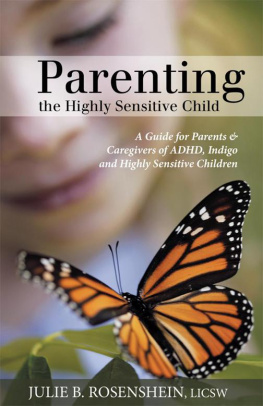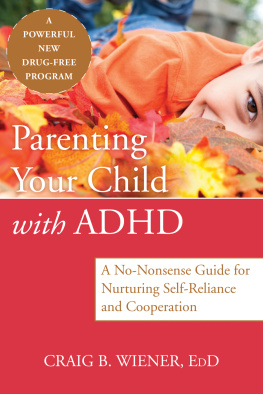
extraordinary parenting
Eloise Rickman is a parent educator who works with clients around the world through online courses and coaching, and through her Instagram account @mightymother_. Her work focuses on evidence-based parenting, home education, and helping families find more rhythm and ease in their daily lives. She is a trained doula, and previously studied social anthropology at Cambridge University, where she first became interested in how childhood and family practices shape society. She lives in south London with her husband, Sam, and young daughter, Frida, who has been home educated from birth.
Scribe Publications
2 John St, Clerkenwell, London, WC1N 2ES, United Kingdom
1820 Edward St, Brunswick, Victoria 3056, Australia
3754 Pleasant Ave, Suite 100, Minneapolis, Minnesota 55409 USA
Published by Scribe in 2020
Copyright Eloise Rickman 2020
All rights reserved. Without limiting the rights under copyright reserved above, no part of this publication may be reproduced, stored in or introduced into a retrieval system, or transmitted, in any form or by any means (electronic, mechanical, photocopying, recording or otherwise) without the prior written permission of the publishers of this book.
The moral rights of the author have been asserted.
Some names and biographical details have been changed to protect individuals privacy.
At the time of writing, all URLs linked to existing websites. The publisher is not responsible for and should not be deemed to endorse or recommend any website other than our own or any content available on the internet (including, without limitation, any website, blog post, or information page) that is not created by the publisher.
9781913348540 (UK edition)
9781922310460 (Australian edition)
9781950354504 (US edition)
9781925938647 (ebook)
Catalogue records for this book are available from the National Library of Australia and the British Library.
scribepublications.co.uk
scribepublications.com.au
scribepublications.com
For Frida.
My bones will always love your bones.
Contents
The five pillars of parenting and educating at home
Educating at home
My parenting philosophy: a beautiful childhood
Chapter One:
Nurturing growing brains
Building resilience
Understanding behaviour as a form of communication
When you disagree on parenting styles
Unconditional Positive Regard
Moving away from control-based parenting
Keeping calm in a crisis
Talking to children about uncertainty
Supporting children through change
Using play to support emotional development
Challenging behaviour and playful parenting
Turning frowns upside down
Play helps children process
Playdough emotions
Positive communication
Nonviolent Communication
When words are not enough
Supporting your child through strong feelings and navigating tantrums
Sportscasting
How to keep yourself calm during tricky times
What to do when youve lost your cool
Connecting through nonverbal communication
The inner work of parenting
Identifying your parenting triggers
Developing self-awareness
Chapter Two:
Rhythm, not routine
Identifying your familys needs and values
Identifying your parenting values
Identifying your familys needs
Daily rhythms
Breathing in, breathing out
Example rhythm for daily life at home with young children
Anchors
Morning time and tea time
Working space for self-care into your daily rhythm
Weekly rhythms
Sites of Mutual Fulfilment
When your weeks are unpredictable
Rhythm for differently wired children
Rhythm when your child has two homes
Finding your rhythm when working from home
Balancing working and childcare
Breathing in, breathing out again
Adapting to your new normal
What about weekends?
Weekends in times of change
Seasonal rhythms
Creating a visual rhythm
Suggestions for visual rhythms
Reclaiming your rhythm when life throws you a curve-ball
Chapter Three:
The home as a prepared environment
Think cosy, not classroom
Making space for beauty
Tips on cleaning for people who hate to clean
Making smaller spaces work for you
Your home is for living, not a show home
Adapting your home to different life stages
Meeting your familys needs through your home
Creating a yes space
How to cultivate a prepared environment if you move around a lot
Meeting your childs need for independence
Meeting your childs need to create
Meeting your childs need for movement
Meeting your childs need for rest
Meeting your childs need for play
Toy rotation
Four steps to better concentration and deeper play
The power of simplicity
The benefits of simplifying
Toys which will stand the test of time
Some of my favourite toys
Cultivating your home to encourage independent play
Chapter Four:
Natural born learners
Knowledge is king
Raising scientists
The impact of stress
Unplanned homeschooling
Navigating the space between school and home
Putting the home in home education
Homeschooling kit list
Learning and play ideas for all ages and stages
Activity ideas for all ages
A note on nature
Activity ideas for toddlers and pre-schoolers
Activity ideas for school-age children
A few words on teenagers
Supporting teens stuck at home
Home education, not school at home
Socialising when you cant go out
Homeschooling through crisis: a note for home educators
Supporting sibling dynamics
What to do when everyone needs you at the same time
Building your childs motivation
The problem with praise
Growth mindset
The erosion of intrinsic motivation
How can I encourage my child without rewards?
Sharing in your childs joy
Chapter Five:
Your needs deserve to be taken seriously
Modelling self-care to our children
Fit your own oxygen mask first
What exactly is self-care?
Know that you deserve care and pleasure
Some ideas for self-care
Nurture your mind
Take care of your mental health
Respect your body
Create a restful home environment
Protect your boundaries
Self-compassion
Bringing mindfulness to our lives as parents
Simple mindfulness exercises
Getting your needs met while parenting
Finding community
Creating space apart from your children
When your needs clash with your childrens needs
Sharing the load
The marriage meeting
Afterword:
Preface
As I write this, for the first time in history, schools and childcare settings in countries across the world have been closed to the majority of children, with no set date to reopen; everyone has been instructed to stay home due to the COVID-19 virus.
This is a worrying time for families, who find themselves juggling childcare and working from home, alongside reduced income and job losses, and the anxiety and health concerns that come with a global pandemic. Millions of parents have suddenly found themselves in the position of effectively having to home educate their children, without any of the resources or research that families who ordinarily homeschool would have access to. And even families who usually homeschool are finding themselves doing so without the groups, classes, museums, parks, and public libraries that form a part of their daily lives.
Next page
